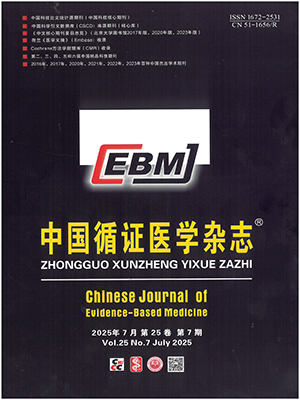| 1. |
吴涵, 姜德春. 新型抗肿瘤药物的个体化治疗基础与临床研究新进展. 中国临床药学杂志, 2025, 34(4): 315-320.
|
| 2. |
Janiaud P, Serghiou S, Ioannidis JPA. New clinical trial designs in the era of precision medicine: an overview of definitions, strengths, weaknesses, and current use in oncology. Cancer Treat Rev, 2019, 73: 20-30.
|
| 3. |
孙荣国, 贾晓蓉. 我国精准医学的探讨. 华西医学, 2016, 31(12): 2076-2078.
|
| 4. |
孙源, 张玲. 主方案设计的研究方法在精准医学中的应用. 中国循证医学杂志, 2023, 23(4): 465-470.
|
| 5. |
Redman MW, Allegra CJ. The master protocol concept. Semin Oncol, 2015, 42(5): 724-730.
|
| 6. |
Lu CC, Li XN, Broglio K, et al. Practical considerations and recommendations for master protocol framework: basket, umbrella and platform trials. Ther Innov Regul Sci, 2021, 55(6): 1145-1115.
|
| 7. |
Arteaga CL, Adamson PC, Engelman JA, et al. AACR cancer progress report 2014. Clin Cancer Res, 2014, 20(19 Suppl): S1-S112.
|
| 8. |
Menis J, Hasan B, Besse B. New clinical research strategies in thoracic oncology: clinical trial design, adaptive, basket and umbrella trials, new end-points and new evaluations of response. Eur Respir Rev, 2014, 23(133): 367-378.
|
| 9. |
Zhou T, Zhang J. Types and progress of clinical trial design for breast cancer: a narrative review. Transl Breast Cancer Res, 2023, 4: 20.
|
| 10. |
张怡君, 田雪, 胥芹, 等. 篮式研究和伞式研究及案例分析. 中国卒中杂志, 2023, 18(2): 240-243.
|
| 11. |
Yin J, Shen S, Shi Q. Challenges, opportunities, and innovative statistical designs for precision oncology trials. Ann Transl Med, 2022, 10(18): 1038.
|
| 12. |
Ouma LO, Wason JMS, Zheng H, et al. Design and analysis of umbrella trials: where do we stand. Front Med (Lausanne), 2022, 9: 1037439.
|
| 13. |
Renfro LA, Sargent DJ. Statistical controversies in clinical research: basket trials, umbrella trials, and other master protocols: a review and examples. Ann Oncol, 2017, 28(1): 34-43.
|
| 14. |
Kesselmeier M, Benda N, Scherag A. Effect size estimates from umbrella designs: handling patients with a positive test result for multiple biomarkers using random or pragmatic subtrial allocation. PLoS One, 2020, 15(8): e0237441.
|
| 15. |
Wason JMS, Brocklehurst P, Yap C. When to keep it simple - adaptive designs are not always useful. BMC Med, 2019, 17(1): 152.
|
| 16. |
Wason JM, Abraham JE, Baird RD, et al. A Bayesian adaptive design for biomarker trials with linked treatments. Br J Cancer, 2015, 113(5): 699-705.
|
| 17. |
Liu Q, Yu W, Gao L, et al. A Bayesian adaptive umbrella trial design with robust information borrowing for screening multiple combination therapies. Stat Biopharm Res, 2023, 16(2): 171-180.
|
| 18. |
Kang D, Coffey CS, Smith BJ, et al. Hierarchical Bayesian clustering design of multiple biomarker subgroups (HCOMBS). Stat Med, 2021, 40(12): 2893-2921.
|
| 19. |
Wang X, Ji X. Sample size estimation in clinical research: from randomized controlled trials to observational studies. Chest, 2020, 158(1S): S12-S20.
|
| 20. |
周小芹, 刘慧珍, 王婷, 等. 肿瘤药物临床试验设计之伞式试验. 中国胸心血管外科临床杂志, 2023, 30(9): 1228-1233.
|
| 21. |
Park JJH, Hsu G, Siden EG, et al. An overview of precision oncology basket and umbrella trials for clinicians. CA Cancer J Clin, 2020, 70(2): 125-137.
|
| 22. |
Simon R. Optimal two-stage designs for phase Ⅱ clinical trials. Control Clin Trials, 1989, 10(1): 1-10.
|
| 23. |
Mander AP, Thompson SG. Two-stage designs optimal under the alternative hypothesis for phase Ⅱ cancer clinical trials. Contemp Clin Trials, 2010, 31(6): 572-578.
|
| 24. |
Yi C, Bian D, Wang J, et al. Anti-PD1 based precision induction therapy in unresectable stage Ⅲ non-small cell lung cancer: a phase II umbrella clinical trial. Nat Commun, 2025, 16(1): 1932.
|
| 25. |
Lee SY. Using Bayesian statistics in confirmatory clinical trials in the regulatory setting: a tutorial review. BMC Med Res Methodol, 2024, 24(1): 110.
|
| 26. |
Matsuyama Y, Sakamoto J, Ohashi Y. A Bayesian hierarchical survival model for the institutional effects in a multi-centre cancer clinical trial. Stat Med, 1998, 17(17): 1893-1908.
|
| 27. |
Yada S, Hamada C. A Bayesian hierarchal modeling approach to shortening phase Ⅰ/Ⅱ trials of anticancer drug combinations. Pharm Stat, 2018, 17(6): 750-760.
|
| 28. |
Berry SM, Broglio KR, Groshen S, et al. Bayesian hierarchical modeling of patient subpopulations: efficient designs of Phase Ⅱ oncology clinical trials. Clin Trials, 2013, 10(5): 720-734.
|
| 29. |
Lee JJ, Xuemin Gu, Suyu Liu. Bayesian adaptive randomization designs for targeted agent development. Clin Trials, 2010, 7(5): 584-596.
|
| 30. |
熊海燕, 罗剑锋, 王伟炳. 药物临床试验的设计创新和技术创新. 复旦学报(医学版), 2025, 52(1): 153-158.
|
| 31. |
Liu Y, Xu H. Sample size re-estimation for pivotal clinical trials. Contemp Clin Trials, 2021, 102: 106215.
|
| 32. |
Hade EM, Young GS, Love RR. Follow up after sample size re-estimation in a breast cancer randomized trial for disease-free survival. Trials, 2019, 20(1): 527.
|
| 33. |
Kim S, Wong WK. Spatial two-stage designs for phase Ⅱ clinical trials. Comput Stat Data Anal, 2022, 169: 107420.
|
| 34. |
Stallard N, Todd S, Parashar D, et al. On the need to adjust for multiplicity in confirmatory clinical trials with master protocols. Ann Oncol, 2019, 30(4): 506-509.
|
| 35. |
Ren Y, Li X, Chen C. Statistical considerations of phase 3 umbrella trials allowing adding one treatment arm mid-trial. Contemp Clin Trials, 2021, 109: 106538.
|
| 36. |
Ballarini NM, Burnett T, Jaki T, et al. Optimizing subgroup selection in two-stage adaptive enrichment and umbrella designs. Stat Med, 2021, 40(12): 2939-2956.
|
| 37. |
Kim ES, Herbst RS, Wistuba II, et al. The BATTLE trial: personalizing therapy for lung cancer. Cancer Discov, 2011, 1(1): 44-53.
|




